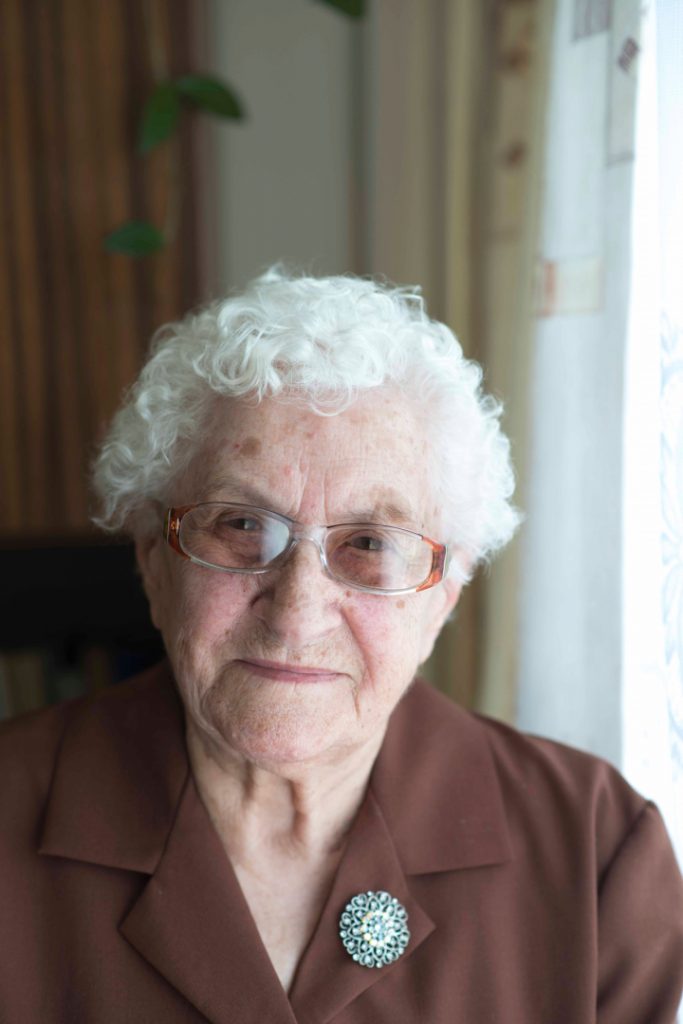
Nadzieja Chodubska, nee Petryna, was born in 1930 in Tomaszów Lubelski. After II World War broke out, she was deported to USRR with her family and siblings. After some time they moved to Kirgistan. There Nadzieja Chodubska’s parents decided to temporarily leave Nadzieja and her younger sister at the orphanage, so that the two of them could safely survive the war turmoil. After long journey Mrs Nadzieja and her sister reached Polish orphanage in Tehran and then Isfahan. In 1944 she was one of the 733 children who found shelter in Polish Children Camp in Pahiatua, New Zealand. She was taken care of by New Zealander family from Masterton with which Mrs Nadzieja lived and which she thinks of fondly to this day.
In 1949 she came back to Poland with her sister. She stays in contact to this day with New Zealanders that gave her second home.
Interviewed by Barbara Majchrowicz on 13th April 2018 in Połczyn Zdrój
Photography and editing by Łukasz Laskowski
Production assistant: Michaj Sodolski
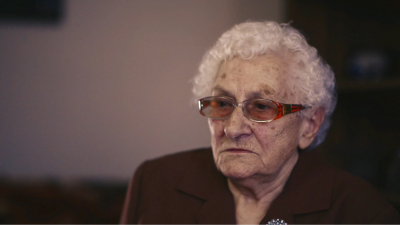
The War began, so my parents just ran from home, because our house was burnt down by the first front. So we continued our journey - I don’t know exactly, I just heard some things from my parents - to my uncle’s house. Which uncle, where – I don’t know either. There was no other place to stay, because our house didn’t exist anymore. The whole homestead, together with the cow, the pigs, the chickens, everything was burnt down. So we just kept moving forward. On the way, you might say, we were caught. You can say so. The army caught us and took away to Russia.
What did it look like?
As I was telling you, we were travelling to the house of an uncle. I just don’t know what uncle, because my parents didn’t tell me. We were supposed to stay at his place, because there was no place for us here and staying at houses of strangers isn’t the best option. It was early dawn... in the morning, we were still asleep in the horse-drawn cart. When I peeked out from under the eiderdown, my mother covered me back and I couldn’t see anything else. I didn’t know who was there or what happened, and then we found ourselves in Russia. I only remember that it was somewhere near the Black Sea, but I don’t know where exactly. We reached the place, or rather we were transported there.
Transported. You mean they escorted your or just told you to go to that exact place?
Later, they put us on trains and so we went. But we didn’t know where to. They only let us out when we were there. We were given a flat, my parents started looking for work. We lived there.
How did you feel when you found yourself in Russia? Do you remember that feeling?
As a child, I thought the city was huge, completely different from what I had known, but I have to admit that I felt rather good there. Yet there was something in my parents that they had to go further and further. I don’t know why or what for. I have no idea. Although it didn’t bother me when I was a child.
Didn’t you sense there was a war raging on, didn’t you sense danger?
You know, I saw very little of the War. Almost nothing, so to say, only some burnt-down houses where the first front went, I saw some dead people, but that was all. I didn’t see much of the War.
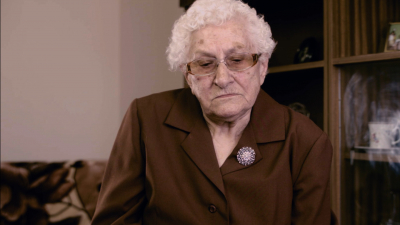
As I have said, my father always looked for a good job. From where we initially lived, we left for Kyrgyzstan... yes, that’s correct, for Kyrgyzstan. There he found a job: constructing or repairing some road. I don’t know exactly, so I can’t tell you. But there was work. So we found ourselves there. He came back for my mother and the rest of his family. And so we went to Kyrgyzstan. Barely had we sat down when my mother lit the fire... we collected brushwood to be able to cook something. It was in the wilderness, you know, Poles lived in a kind of hut. They helped to construct the roads, but they lived in the hut. There was nothing, only the hut, but mostly just wilderness. And at some point, two women came there with a priest. They came, all very well, and since there was a priest, he said mass, because people craved for it, they hadn’t attended one in a long time. After the mass, I remember, a suggestion was made that parents should put their children in an orphanage and the orphanage would take us abroad. With time, the parents would go abroad too, to find their children. That I know. Both my mum and my dad consented eagerly. Everybody did. They signed the children up. My mum signed up all of us, even my brother. We were all supposed to go. When the day came when we had to go, we went to that... I don’t know how far it was to the train station in the town, but never mind that. Anyway, we went to the train station and we caught our train. But my mum told my brother to stay behind. She sent only me and my sister. We said our goodbyes and off we went. The journey was long, very long, and we ended up in Tehran. Before we crossed the border, after all that riding, they gave us a bath and cut our hair, they left us hairless. Now I understand that they had to, that it was necessary. Although some of us cried, it had to be done. And so we found ourselves in Tehran.
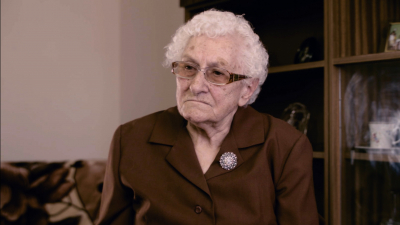
Where did you live in Tehran?
In an orphanage. What do you call it? It was a house rented from some people. I lived in a big house in which, you know, at first, we lived, excuse me... At first, children lived on one side and Polish soldiers on the other. Those were barracks. And we lived in those barracks. We had care on the spot and a doctor, and everything. Well, we had good care in Tehran, when we finally got there. Later, in Isfahan, it was the same. In Isfahan, we lived in rented houses. No, not like that. What should I call it... We lived in an orphanage, I lived under number 12 and my sister under number 8. In the city centre. I lived more on the outskirts of the city. We felt good there. There was such a beautiful garden around that house and grapes grew in it. It was beautiful and the house itself was beautiful too. The care was good, we were given food, we had a place to sleep. We were taken care of by women who loved us like we had been their own children. We felt good, we couldn’t complain about anything. We didn’t lack anything. During the War at that.
How did the local Persian community react to Polish children? What kind of contact did you have?
You mean with the community?
Yes, with the Persians.
We had very little contact. We couldn’t really get in touch with the local people. The area we lived in was sort of closed. There was a gate, an entrance, and we were guarded. So we couldn’t take the liberty of going out.
So you lived in closed centres?
Yes, we lived in a closed area, both in Tehran and in Isfahan.
Were there any Polish schools in Persia?
If there happened to be a teacher there, she always taught us.
Did you play truant?
Oh, yes, I did like playing truant when I was young. I was a very energetic child.
What did you do then?
I don’t know, I can’t tell you exactly. But no, I didn’t cut class that much, I didn’t run away. I just liked to go places. Somehow, school didn’t interest me much. I don’t know why. It just didn’t. Different things happened. Sometimes I cut class... Like children do.
Did you celebrate Polish holidays in those orphanages?
Yes, we did celebrate Polish holidays.
Did it somehow remind you of Poland, did it bring Poland closer to you?
You know, maybe we didn’t have that much, maybe... I’ll rephrase it. Maybe we didn’t celebrate them profusely, because we didn’t have the means, but if there was a holiday, we had a holiday.
Did you sometimes think about Poland and what was happening there?
All of us did, not just me – all children always thought about Poland, after all it was Poland. All the more so we thought about home and about our parents, because we were left without a family and without a home. Everybody thought about it. And it was all we talked about it in the evening: when we would return, when we would be back home, when we would see our parents. We had such talks.
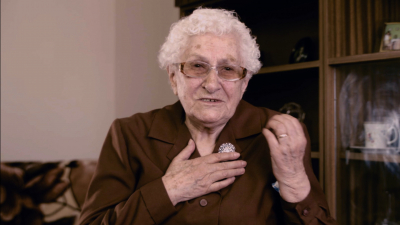
New Zealand popped up after Sikorski’s death. They started bringing families back together and searched for everybody’s relatives, whether they were in the army or in England, or in Scotland. They looked for any surviving relatives and sent children to where they lived. We called it “bonding families back”. It’s what it was called. I, in turn, didn’t have anyone. Nowhere. My parents were in Russia. So I would have to go back to my parents. So they gathered such orphans like me and New Zealand took us in.
Was New Zealand the only option? Didn’t you have any other choice? Because there were transports organised to other places as well. Did you hear anything about that back then?
Oh, yes, there were, even to Syria. People talked about them. But we were chosen and it was New Zealand that agreed to take us in. Such were the stories I heard. And they took us in.
Do you remember the day when you heard that you were going to New Zealand?
I remember, because I was already separated in the orphanage from other children, I lived on another block, where we were waiting for the departure and there we got to know we would go to New Zealand.
How did you feel when you heard the news?
Just imagine how can a child feel in such a situation... We were going. We didn’t know where to, how, and how far. We didn’t know any of that.
Did you have to go or could you choose to stay?
No... As a child I didn’t resist, I didn’t say I didn’t want to go or anything like that. Where I was destined to go, I went. Later, when they gathered all the orphans without parents, without... in other words, orphans... there were almost 1,000 of us, over seven hundred or eight hundred; New Zealand agreed to take us in.
Were you somehow prepared for the journey?
Who was supposed to prepare us? What did we have? We didn’t have any luggage. We had only the things our bodies were covered with, so to speak. We didn’t have any luggage, so there were no special preparations. They just gathered us for transport – at first, in wagons, by train, and then – so to say – by sea. The sea journey to New Zealand was very long. Well, at least we thought it took a long time. Although the journey was quite nice. We had good care. In fact, maybe even too good, because we were escorted by the army to Australia, but there were New Zealanders there as well and a fight broke out about who was supposed to take care of us – whether we were going to New Zealand or to Australia. Finally, they somehow got the information that our destination was New Zealand, so the army started to take care of us, New Zealanders I mean.
Soldiers?
Soldiers on board ship.
What did that care look like?
The care was beautiful, it was very good.
Could you describe it?
Each and every soldier was very nice towards us, children. Well, it’s what I experienced, I’m speaking about myself. They were very nice. When you met a soldier, he shook your hand. You see, they were nice even though we didn’t understand them and we didn’t know what to say, because nobody had taught us English yet. But they were very nice, they escorted us by the hand, treated us to sweets. Yes, we had good care, very good.
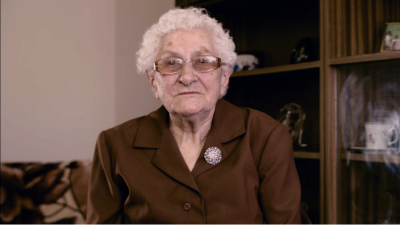
Oh, I do remember.
Tell me about it.
I remember. We got a pleasant, hearty welcome. There were lots of people in the port. And the army appeared again to transport us to the train station to get us to Pahiatua. It was all the army. It was the army who took such good care of us. We didn’t understand them, but they understood us. They were very pleasant. Surely, all children had good care, no harm was ever done to them. I felt very good. They took us by cars from the port and we got out of the cars in the capital, in Wellington.
How did you travel from Wellington?
I’m sorry, I didn’t catch that.
How did you continue your journey from Wellington?
On a train, but the army transported us from the port to the station.
Was the welcome a hearty one?
The welcome was very nice.
And at the stations?
The welcome at the stations was even nicer, because there were people who could board the train to greet us. Very nice people. I mean, New Zealanders are very nice, because we, all the children, got a hearty welcome. I mean, it’s my personal feeling, but somebody caught me in their arms, embraced, stroked on the head. For us, it meant a lot... She embraced me – I don’t know that person, I still don’t know her – she hugged me, patted me and treated me to some sweets. And I think everybody’s experience was the same. They welcomed us pleasantly. The New Zealanders were very pleasant, they welcomed us nicely. And so we went to Bahiotue by car and we were welcomed there heartily as well. The army prepared everything, the kitchen belonged to the army and there were soldiers everywhere. It was very pleasant, indeed. There were soldiers in kitchens and they took care of us until the men and women gradually took over the care, because there were also our carers there. At that time, the army went away, but it was mostly soldiers who took care of us.
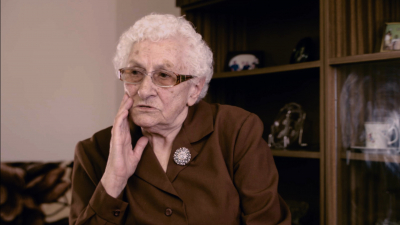
Everybody wondered at how far we were from Poland. Because for us New Zealand was at the other end of the world. And we always had this thought at the back of our heads: how far we were from our motherland. Almost everybody thought about it. Even when we spoke with a friend or when a brood of children gathered in a room, we talked about how far we were from home. Maybe we were so overwhelmed by fear that we were so far away and that we would never go back home because of that distance.
Did you have such a feeling?
Some of us, for instance me, had a feeling that we would never see our family again. We had such a feeling and it was real, because New Zealand is very far from Poland.
So some of you had the feeling that they left...
That they left and would never go back.
Were there any people who wanted to go back? Who hoped they would?
You know, I think there were lots of such people. In my opinion, everybody wanted to go back, wanted to find their parents or wanted their parents to find them. For us, it was important.
Did any parents come there with time and find their children?
Soldiers – yes, later they even connected... I remember one day a soldier come, who had as many as four daughters there. And he came to meet his children. I don’t know how it happened, whether he found them or whether they found him. I can’t tell you that, because I don’t know. It wasn’t such a close friend of mine. But we saw that soldier who had just come to see his children. So they started connecting people. Maybe it was to the credit of the Red Cross, this thought did cross my mind. I mean, you know, they searched for people, they found them and later they connected them.
Did you look for your parents?
Yes, I did. But I was sure I wouldn’t find them, that they had stayed in Russia.
What channels did you use to track them?
Well, we looked for them using channels... I mean, we had help – people who looked for others. We could always go there and ask, there were carers and they helped us; they wrote something through the Red Cross or helped to write something. When you remembered something, like names, appearance, place of stay, you could go there and tell them that, and they helped.
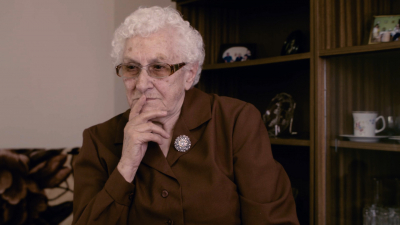
Did you have a feeling at that time that something would happen to the camp now that the War was over?
You know, I personally didn’t have such a feeling. Maybe some of the older children, maybe some of them yes. Older kids are wiser. But I didn’t feel so, because I had a good family.
So maybe you could tell me something about them?
I had a second family, so to speak, to which I could go at any time and they would take me in. I met that family by accident, because in the camp there was... I mean, there was a practice that people wrote letters. For example, a woman wished to take in a child from the camp, a boy or a girl, at such and such age, for holidays. Then she was responsible for that child, for taking care of them and everything, because the camp knew where the child was. During my first year there, I wasn’t lucky enough to go... to go away. But I did go away in my second year. It was a lucky mistake. The person in whose house I stayed wanted to take in a boy who would be 10, 12 or 14 years old, because she had a son who was 4 and she wanted someone to play with that child. In turn, they must have mistaken me for a boy in the camp. And they sent me instead. She was very surprised. But she had to take me in, since I travelled by train all the way up to Masterton. It was a long way from the camp, as if I had travelled there from Koszalin. And you know what? She took me in. Probably, I did well as a girl. I took to that child with all my heart. We played together every day: we went to different places, we had fun together, she took us to the cinema. She took very good care of me as well. After some time, she had to send me back home, to the camp. I called it my home, because it actually was my home. The next year was good for me too. But I felt even better when I stayed at my family’s place. Until their death... I was already living in Poland... When I was leaving New Zealand, I got a telegram. They wrote me a telegram: “Dear Nadzia, if you have changed your mind, there will always be a place for you in our home”. I wanted to leave the ship with that telegram, but it had already ridden too far and I couldn’t, I had to go Poland. But I had a good family, I had a good second family. And they wrote to me until their death, they even aided me.
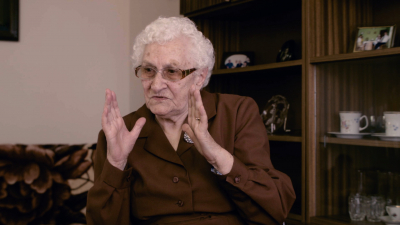
The only thing we knew was that the War was over. Maybe if we had seen it, life would have panned out differently, but we didn’t see it.
What did you feel when you came to Poland and saw the reality of ‘49, do you remember?
What did I feel? I felt it was a huge mistake. But I had to accept thing as they were. There was no turning back. When I came to Poland, I had to create a life and live it, heigh-ho. In my childhood, I learned that people should take life as it is. It can’t be helped. We couldn’t foresee everything, we couldn’t know everything, because children can’t know everything. Surely, you don’t tell your children everything either... Adults don’t tell children such things. So we didn’t know many things either: how it was going to be, what and why, how the War ended. It was just finished, end of story.
What did you do when you finally came back to Poland?
What did I do? When I came back to Poland, I tried to find a job.
You took up residence in Białogard, is that right?
Yes, I took up residence in Białogard with my mum, because most probably my dad had died. But I don’t know if that was true... Mum wouldn’t believe it. [Did she get any document?] Probably, she got a document stating that he was dead.
But she didn’t believe it...
She told me, “No, he will come back and that’s that”. So we stayed there and I started to look for a job. [Where did you find your first employment?] I found it in a day nursery in a power plant... in the kitchen. There was a day nursery, the power plant ran it and older children, later younger ones as well... there was a day care centre for the older ones. I was employed as a kitchen maid, because there already was a lunch lady there. Later, I started working with children and so it all went.
Do you remember the first meeting with your mum after the War?
Of course, I do! I came, I greeted my mother and she said to me, “I thought you were smarter than that”. Now, what she meant... My mum sent a visa for us to come. We came, which wasn’t a good thing. She sent a visa and thought I was smarter than that and I wouldn’t come. That was... I wasn’t smarter than that, I just missed them.
Did you miss your mum? How did your sister feel?
She was the one who organised it all. To be honest with you, my sister completely broke down after that, because I later told her what she had done. And I wasn’t much smarter, because I could have let her go and stayed myself. I just didn’t have anyone who would advise me, talk to me or something, tell me there were two of us and I could have sent her to see and write back... Could I have done that? Yes, I could have. But I didn’t get such advice from anyone.
How much time had passed before you had that conversation with your sister?
How much time? Short time. We had that conversation. She even took offence at me, slightly but still. She left Białogard altogether to look for a job elsewhere while I stayed with my mum and my brother. She left...
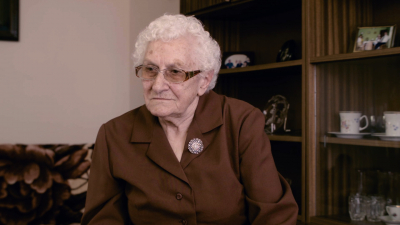
By the way, when you had come back to Poland, did people react somehow to the fact that you had come from the West, from abroad?
Those who knew me, were familiar with that fact. But I couldn’t write in any application that I came from abroad, because whenever I did write that I’d spent some time here and there and came from New Zealand, everybody who read it looked at me as if I had been... I’m sorry, but I won’t verbalise it, you can guess yourself...
You mean in a job application?
Yes, job application. Mind you, in the beginning, one had to write an application stating that one came here and... you know. Later, I got wiser and stopped writing it, but it was much later.
So people marvelled at the fact that you came from abroad?
Very much so, very much. Some even said that... Can you guess? At first, I took offence, but later I thought, “No! They are right”. When people asked me, “Did you really?” I said, “Yes, I did it”. When I came to Poland, a soldier who fought in the Battle of Monte Cassino visited me. I had just returned to Poland when he paid me a visit. He was injured and he told me the same thing. He said that he had lost his mind but that I had lost mine too... Oh, well... That’s life, you know.
Didn’t you plan to return to that family after some time?
Oh, I had plans... Big plans even... [What big plans did you have?] Plans to go back to live with that family, because there was always a place for me there. Just like they had promised. They often mentioned it in their letters: “There’s always a place for you in our home”. They liked me and I loved them.
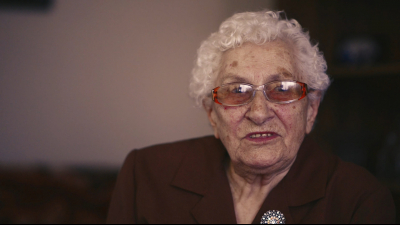
Would you like to visit New Zealand once again?
At my age it’s a bit too far to travel, I guess... But I often think that I would like to go to that place and see how... There is an empty square there and a monument with names, close to the road. I know some things, you see. But there is nobody there now, not even the barracks are left, there’s just the monument. The family has died. The only person who is still alive is... I don’t even know whether the children still live. There is nobody to visit. My friend is dead. Because if she were still alive, she would take me in. It’s no use going there, sitting down in the middle of that square and staring at it. My age won’t let me... Were I a couple of years younger! Eight years ago my dreams would have come true. Now there’s no point in moving. Old age is no picnic. No can do. No can do. Life has to continue for some more time. At least I won’t take the memory of New Zealand to the grave with me, it will remain. Let it remain.
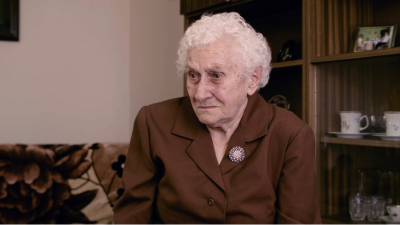
New Zealanders are very, very nice. They didn’t harm anyone. Not even with words.
Do you often think about New Zealand? Or is it better not to think?
I think about it every single day... New Zealand is my second home. When you have a good life, what else can you want? When you have a bad life, it’s another pair of shoes... But when you have a good one? And I’ve had a good life, a really good life... I really wish everybody could have a family like mine. Even though it was my second... an alien family, so to speak, but it was my home. And I wish everybody could have that. I wish every orphan could have such a family.
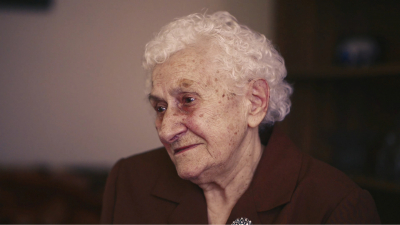
At first, as you already know, they took us from our parents and our parents never came, so we thought we would never see anybody again, neither my parents nor anybody else... Maybe that is why I took to that family so much when I went on holiday from the camp, because I truly believed I was an orphan. Now I try to rationalise it: it happened during the War and I have to come to terms with the facts. In peacetime it would all be different, but it was during the War. My mum told stories about World War I and then she survived World War II, so, you know, I blame the War for everything. What else could I do? There were bad times, but there were good times and very good times as well. But I don’t wish anyone had to live through war ever again, had to roam the world. Oh, dear.



